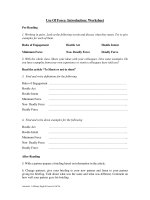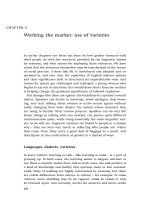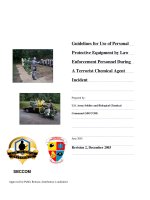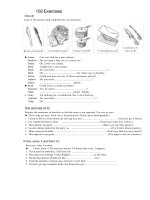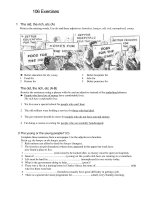Correct use of personal pronouns
Bạn đang xem bản rút gọn của tài liệu. Xem và tải ngay bản đầy đủ của tài liệu tại đây (8.61 KB, 1 trang )
Correct Use of Personal Pronouns
A personal pronoun must be of the same number, gender and person as the noun it stands for.
John
is a good boy.
He
loves and respects his parents and teachers. (Here the pronoun
he
is of the same
number, gender and person as the noun John.)
Alice
is my sister.
She
lives abroad. (Here the pronoun
she
is of the same number, gender and person as the
noun Alice.)
The
students
worked hard.
Their
teacher praised
them
. (Here the plural pronoun
them
is of the same number,
gender and person as the plural noun students.)
A personal pronoun referring back to a collective noun must be in the singular number if the collective noun is
viewed as a whole.
The jury
has given
its
verdict.
The
fleet
will reach
its
destination in a week.
If the focus is on the individual members of the group, the pronoun should be in the plural number.
The jury
were divided in
their
opinion.
When two or more singular nouns are joined by
and
, the pronoun used for them must be plural in number.
Both John and Peter
played well.
They
were praised by the coach.
When two singular nouns joined by
and
refer to the same person, the pronoun must be singular in number.
The Secretary and Treasurer
is negligent of his duty. (Here the nouns Secretary and Treasurer refer to the same
person. Therefore we use a singular pronoun to refer back to them.)
Note that when two nouns refer to the same person, the determiner (the, my, this etc.) is used only before the first
one.
My uncle and guardian is a doctor. (Here the nouns uncle and guardian refer to the same person.)
My uncle and my guardian are doctors. (Here the nouns uncle and guardian refer to two persons.)
When two singular nouns joined by
and
are preceded by
each
or
every
, the pronoun must be singular in number.
Every
soldier and
every
sailor was in
his
place.
When two or more singular nouns are joined by
or, either …or
or
neither…nor
, the pronoun should be singular
in number.
Either
Alice
or
Mary forgot to take
her
umbrella.
Neither
Peter
nor
John has done his homework.
Be first to know when grammar rules change! Sign up to our newsletter here: englishgrammar.org (It's free)
Powered by TCPDF (www.tcpdf.org)
